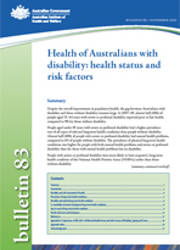Summary
Despite the overall improvement in population health, the gap between Australians with disability and those without disability remains large. In 2007–08, almost half (46%) of people aged 15–64 years with severe or profound disability reported poor or fair health, compared to 5% for those without disability.
People aged under 65 years with severe or profound disability had a higher prevalence rate of all types of selected long-term health conditions than people without disability. Almost half (48%) of people with severe or profound disability had mental health problems, compared to 6% of people without disability. The prevalence of physical long-term health conditions was higher for people with both mental health problems and severe or profound disability than for those with mental health problems but no disability.
People with severe or profound disability were more likely to have acquired a long-term health condition of the National Health Priority Areas (NHPAs) earlier than those without disability.
Among people aged under 65 years with severe or profound disability and mental health problems, the proportion who had behavioural and emotional problems with usual onset in childhood or adolescence was 14%, compared to 7% of those without disability.
Among people aged 15–64 years with a specific long-term health condition of NHPAs, the comparisons between people with severe or profound disability and those without disability showed that:
- the proportion who had diabetes or a high sugar level before the age of 25 years was 23% versus 7%
- the proportion who acquired arthritis before the age of 25 years was 14% versus 6%
- the proportion who first experienced osteoporosis before the age of 45 years was 43% versus 31%.
About 69% of adults aged 18–64 years with severe or profound disability were overweight or obese, compared with 58% for those without disability.
People aged 35–64 years with severe or profound disability who were overweight or obese were more likely than those without disability to report both cardiovascular diseases and diabetes (9% versus 1%).
Compared to people without disability aged 15–64 years, people of the same age with severe or profound disability were more likely to do a very low level of exercise or no exercise (43% versus 31%); to be current daily smokers (31% versus 18%); to start smoking before the age of 18 years (38% versus 22%); and were less likely to have never smoked (42% versus 61%).
About 42% of people aged 16–64 years with severe or profound disability had seriously thought about committing suicide, including 18% who had attempted suicide. This was associated with their high prevalence of mental and behavioural problems.
Introduction
Disability and self-assessment of health
Prevalence of long-term health conditions
Disability and related long-term health conditions
Co-morbidity of mental and physical long-term health conditions
Age at onset of long-term health conditions
Health risk factors and behaviours
Appendix A: Comparisons of ABS 2007–08 National Health Survey and 2003 Survey of Disability, Ageing and Carers
End matter: References; Appendix tables; Acknowledgments; Verso pages



